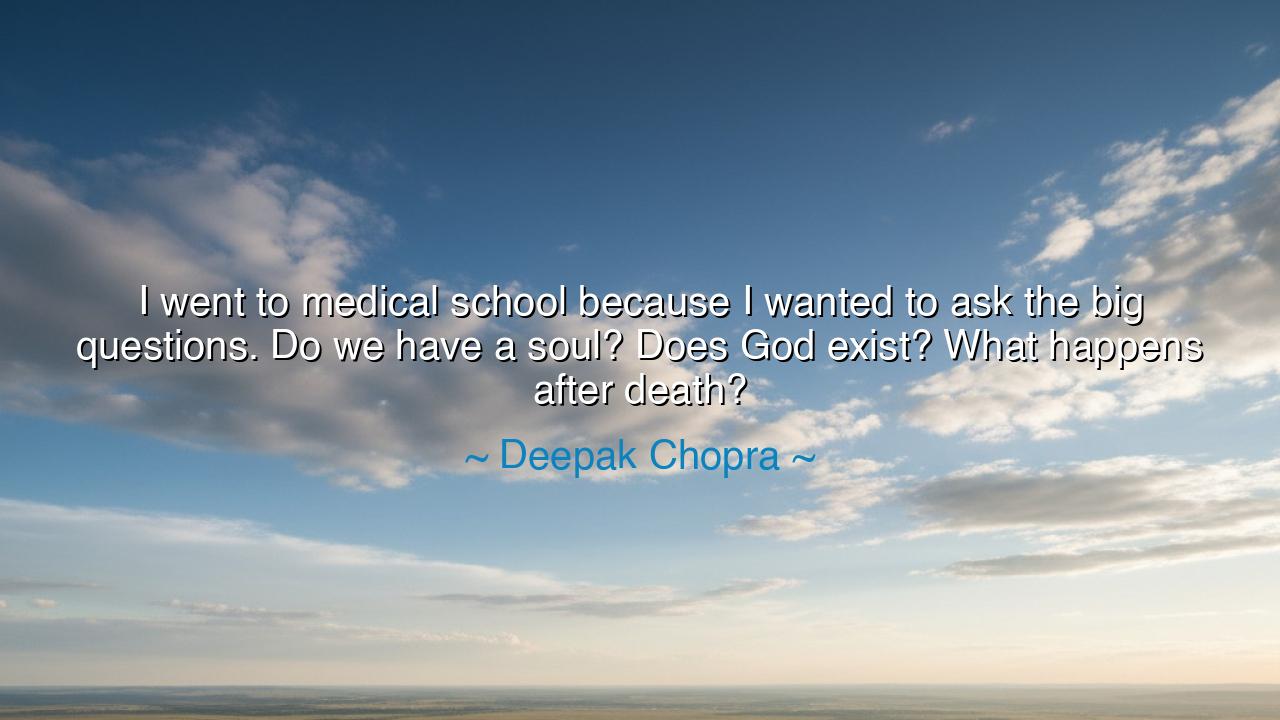
I went to medical school because I wanted to ask the big
I went to medical school because I wanted to ask the big questions. Do we have a soul? Does God exist? What happens after death?






"I went to medical school because I wanted to ask the big questions. Do we have a soul? Does God exist? What happens after death?" These words from Deepak Chopra strike at the heart of humanity's most profound inquiries—the search for meaning, purpose, and truth. For Chopra, the path to medicine was not merely a career choice but a journey into the deepest questions of existence. It was a calling to understand not just the body, but the spirit, the mind, and the very nature of life and death. In his pursuit, Chopra reminds us that medicine is not just about healing the body but about exploring the mysteries of the human experience—questions that transcend the limits of science and touch on the eternal.
In the ancient world, there were those who, like Chopra, sought to understand the mysteries of existence through the study of the body and soul. Plato, the great philosopher of ancient Greece, believed that the soul was the most important part of a person and that it should be cared for as much as the body. For Plato, true knowledge and wisdom were not found merely in physical realities, but in the realm of ideas and the eternal truths that governed existence. Similarly, the Hindu and Buddhist traditions, which Chopra draws inspiration from, have long posited that life is not just a physical experience, but a spiritual journey. The questions Chopra raises—what happens after death?—are ancient inquiries that have guided philosophers, healers, and spiritual seekers for millennia.
Socrates, too, questioned the nature of existence, often asking whether the soul was immortal and what its true nature was. His famous dialogue in the Phaedo explores the nature of the soul and its relationship to life and death. Socrates, before his execution, spoke to his followers about his beliefs in an afterlife, offering comfort that death was not an end but a transition. This profound exploration of the soul’s fate echoes Chopra's own curiosity. Like Socrates, Chopra was not satisfied with the purely materialistic explanations of the world but sought to understand the deeper spiritual truths that govern existence. The big questions of the soul, God, and the afterlife are timeless, transcending any single philosophy or religion and touching the core of the human quest for understanding.
This drive to explore the unknown, to question the very nature of existence, is evident in the stories of many great spiritual leaders throughout history. Rumi, the 13th-century Persian poet and mystic, searched tirelessly for answers to the mysteries of the soul and God. His poetry is filled with questions about love, life, and the nature of existence, often suggesting that the answers lie not in external knowledge but within the depths of the soul itself. Rumi's teachings, like Chopra’s, point us to the inward journey—the realization that the big questions are not just external mysteries to be solved but internal experiences to be understood and lived.
For Chopra, medicine became the vessel for exploring these questions, offering a bridge between the material and the spiritual. He recognized that while the body could be treated with science and medical expertise, the soul—the spirit of a person—was an entirely different matter. This quest to bridge the gap between science and spirituality is seen in Chopra’s mind-body medicine, where the emotional, mental, and spiritual health of the patient is as important as their physical health. In this, Chopra follows in the footsteps of ancient healers like Hippocrates, who understood that healing the body required a holistic approach—one that considered the mind and spirit as well. The ancient belief that health is the balance between the body, mind, and soul continues to echo through Chopra’s work.
The lesson we learn from Chopra’s reflection is that the big questions—those about life, death, and the soul—are not separate from the work we do in the world. Whether we are doctors, philosophers, artists, or simply human beings trying to make sense of existence, these questions are central to our experience. They compel us to look beyond the physical, to explore the unseen and the unknown. They push us to balance the rational and the emotional, the material and the spiritual. As Socrates taught, the pursuit of wisdom is the highest goal of life, and wisdom comes from questioning everything—even our deepest beliefs about the nature of self and universe.
In our own lives, we should take Chopra’s words as a call to embrace curiosity, to question the nature of our existence, and to search for deeper truths. As we seek answers to the big questions, we must remember that knowledge is not only found in books or lectures, but in the experience of living. The journey is just as important as the destination. Just as Plato, Socrates, and Rumi searched for answers not through mere intellectualism, but through lived experience, so must we. Let us walk through life with open hearts and minds, ready to explore the mysteries of our own existence, guided by the eternal questions of the soul and the unknown.






AAdministratorAdministrator
Welcome, honored guests. Please leave a comment, we will respond soon